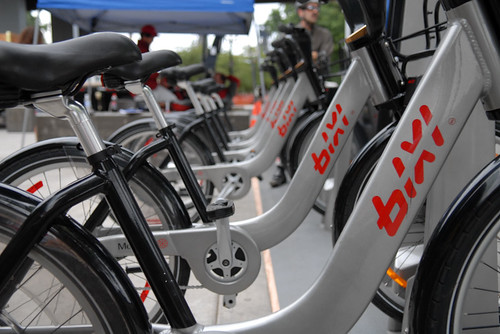
(Photo by J. Maus/BikePortland)
More big — and bad — news from Montreal’s Public Bicycle System Company (PBSC, a.k.a. Bixi) was announced yesterday. The company that supplies the hardware and software for America’s largest bike share systems has filed for bankruptcy protection to help restructure $38 million in debt.
In other words, in order to continue operating, the company has been granted the right to ignore some of its debts and negotiate with its creditors on any other available ways to compensate them. Though this doesn’t seem likely to directly affect Portland’s coming bicycle share system launch (and may actually improve things, since a bankruptcy-protected Bixi could be more financially stable) it is big news within the fast-growing bike sharing industry.
Given our plans to expand current systems and launch new systems this year, we’re in constant communication with both PBSC as well as its suppliers to ensure we can do so successfully.
— Alta Bicycle Share
Bixi supplies the rental station kiosks, software, and other technologies for bike share systems in New York City, Chicago, Washington D.C., and others. The company was created in 2007 by Montreal’s parking authority and it helped set off a tidal wave of bike share systems in North America. But for several years Bixi has been beset by financial and legal problems that seem to have finally caught up with them.
Bixi is also the equipment and technology supplier to Alta Bicycle Share, the local company that is currently working to launch Portland’s bike share system.
In an email Tuesday, Alta vice president Mia Birk wrote that Portland Bike Share is still planning on using Bixi equipment.
“We still get to use the award-winning, top-of-class system,” Birk wrote. “Our 2014 system will launch as planned.”
On their blog yesterday, Alta wrote that its systems will “continue to operate without interruption” and that “given our plans to expand current systems and launch new systems this year, we’re in constant communication with both PBSC as well as its suppliers to ensure we can do so successfully.”
As they have in the past when Bixi’s software delays made headlines in New York City, Alta continues to say that the company’s business trouble won’t impact the delivery of Portland’s system. That being said, Andy Riga of the Montreal Gazette reports that Alta is asking Bixi for $11 million in damages. Those damages are likely related to the delays by Bixi to deliver software that runs the bike share systems.
This bankruptcy of a key supplier comes as the Portland Bureau of Transportation and Alta Bicycle Share are nearing a public announcement of a private sponsorship deal that will fund operations of Portland bike share. While this news is likely to bring out even more skepticism from bike share detractors, Bixi’s problems are more a function of poor business practices and less a sign that bike share itself is a risky proposition.
Doubts about Bixi’s business plan surfaced early on. The idea initially pushed by the City of Montreal (who made a promise similar to Portland that the system would cost taxpayers nothing) was to develop the premier bike share equipment and technology in the world (which they did) and then finance the operation of their system by selling copies of the Bixi system to other cities. On the surface, the plan worked. Cities all over the world flocked to Bixi’s system and there are now over 37,000 Bixi bikes in operation. However, the business arrangement that mixed government, politics and private business — was fraught with risk from the beginning.
As Canadian magazine Maclean’s wrote last month, Montreal’s inspector general concluded in 2011 that “Bixi was essentially conceived on a whim: ‘No one interviewed could provide any feasibility studies, business plans, risk analysis or cost-advantage studies.'”
That’s not the case with Bixi clients such as Portland Bicycle Share itself. And the continued operation of Bixi’s biggest competitor, the Trek-backed B-Cycle, suggests there’s nothing inherently unprofitable about bike-share equipment manufacturing.
But Bixi’s problems as a company will need to be resolved somehow if it’s going to keep serving clients, including Alta and Portland Bicycle Share.
As for Alta itself, a report on Forbes this morning hints at how they could possibly be in an even more dominant position after all the dust settles. “What happens to cities with Bixi bike sharing programs?” writes Forbes. (That’d be Montreal, Toronto and Ottawa.) “They could find other operators, such as Alta Bike Share, or run the systems themselves.”
News Editor Michael Andersen contributed to this story.
— For more background on this story, read the excellent coverage by Andy Riga in the Montreal Gazette.

